
25 minute read
Annex D - Address by Dr J. B. Macdonald
.4. By the same token, Commonwealth associations facilitate the advancement of techniques and the development of methods for dealing with novel situations, which enables the professions to be more effective and to provide a better service than would otherwise be possible. In particular this enhances the quality of the advice which a profession can offer to governments, because it can tackle novel situations with the benefit of knowing how they have been tackled elsewhere. This can be particularly helpful in developing countries where the profession may be relatively young and small in numbers, and be still in the process of developing its resources and its competence to advise government on important public issues; bearing in mind always, of course, that local problems usually need local solutions, and that solutions adopted elsewhere may not necessarily be suitable transplants. To serve a community properly, a profession must obviously have the manpower resources which this requires. With some of the less well-known professions, like surveying and land economy, this is not easy to achieve. In most Commonwealth countries there is a serious manpower shortage in each of these fields, and the provision of additional facilities for education and training is usually a very slow process. This means that the 'CASLE' professions are often not providing the full professional services that are needed; and it means also that the small numbers of professional people who are available are so fully committed in their day-to-day work that they do not have enough time to devote to the service of their professional society in promoting its contribution to opinion forming and to national policy making. In this respect one must recognize that developing countries which are short of skilled manpower, and whose professional societies may not yet have developed a tradition of advising on public policy, may have to be patient in reaching that degree of collaboration that exists in other countries between governments and the professions. .6. It may seem unnecessary to stress the importance of professional views being objective and dispassionate, but I do so for two reasons. In the first place, if they are not so, they will probably be discounted or ignored by the bodies or individuals they aim to influence. In the second place, objectivity is more difficult to achieve than many people imagine. Through the nature of their work, individual practitioners may develop strong political opinions which, as private citizens, they are perfectly entitled to hold; and their familiarity with the status quo may arouse reactionary attitudes to new philosophies. When a corporate body seeks to express a view, however, it must eschew politics and concern itself with the professional aspects of the subject. This requires a positive effort to achieve a balanced professional view. There is no doubt that, in the past, certain professional organizations in the UK, which had their roots in the private sector and at the outset provided their services solely to private Page seventy-two
clients, are mistakenly regarded by the public (even today when the accusation is no longer valid) as being conservative in their attitudes and preoccupied with the protection of existing private interests. It is therefore important that any profession which seeks to participate in matters of public concern should be at pains to show that objectivity is its motivation. To achieve this it will also need to develop a perceptive understanding of public opinion and the influences which tend to form that opinion; and be able to anticipate public reactions to new situations if it is to help in steering opinion in the right dierction. 5.7. Professional societies, of course, are not primarily propagandists and their influence on public opinion tends to be indirect. Nevertheless, through the activities I have briefly described in this paper, the professions do influence public attitudes, although this is perhaps less pronounced than it might be. This is due in part to the widespread influence of the mass media, which tend to give greater prominence to the controversial views of protagonists and antagonists than they do to the sober judgements of the professionals. This is particularly noticeable in matters that are politically sensitive where, for reasons I have already noted, the professional tends to stand aside from the purely political arguments. Nevertheless, the professions are gradually making a greater contribution to public debates on issues concerning the environment, and this helps the public to be better informed and to form sounder judgements than might otherwise be the case. To be effective, the professions need to make use of all the media, including all arms of the press (national, provincial, local, professional and technical); radio and television; and personal contact through societies, conferences and similar channels. Influencing public opinion or informing specialized publics can only be successful, however, if the profession's views are of topical interest and if those views are both imaginative in themselves and imaginatively presented. This requires considerable effort and resources, and may often be beyond the means of small professional bodies in particular. In such circumstances, the effort may have to be selective, and more success may be achieved by concentrating on special groups that are likely to be particularly interested and receptive to informed advice. 5.8. The professions can also assist the public to understand complex issues by the publication of appropriate literature. In the UK, this covers such matters as the sale and purchase of property, property maintenance and rehabilitation, the letting of building contracts, and the interpretation of legislation affecting the ownership and development of land. They also seek to foster good practice by the publication of standard forms of contract, codes of prac. tice, and other documentation designed to promote efficiency in all aspects of professional work. This all contributes to a better understanding of environmental problems and an awareness not only of what is in the individual' s person interest, but also of the wider public interest that is inseparable from it.
Advertisement
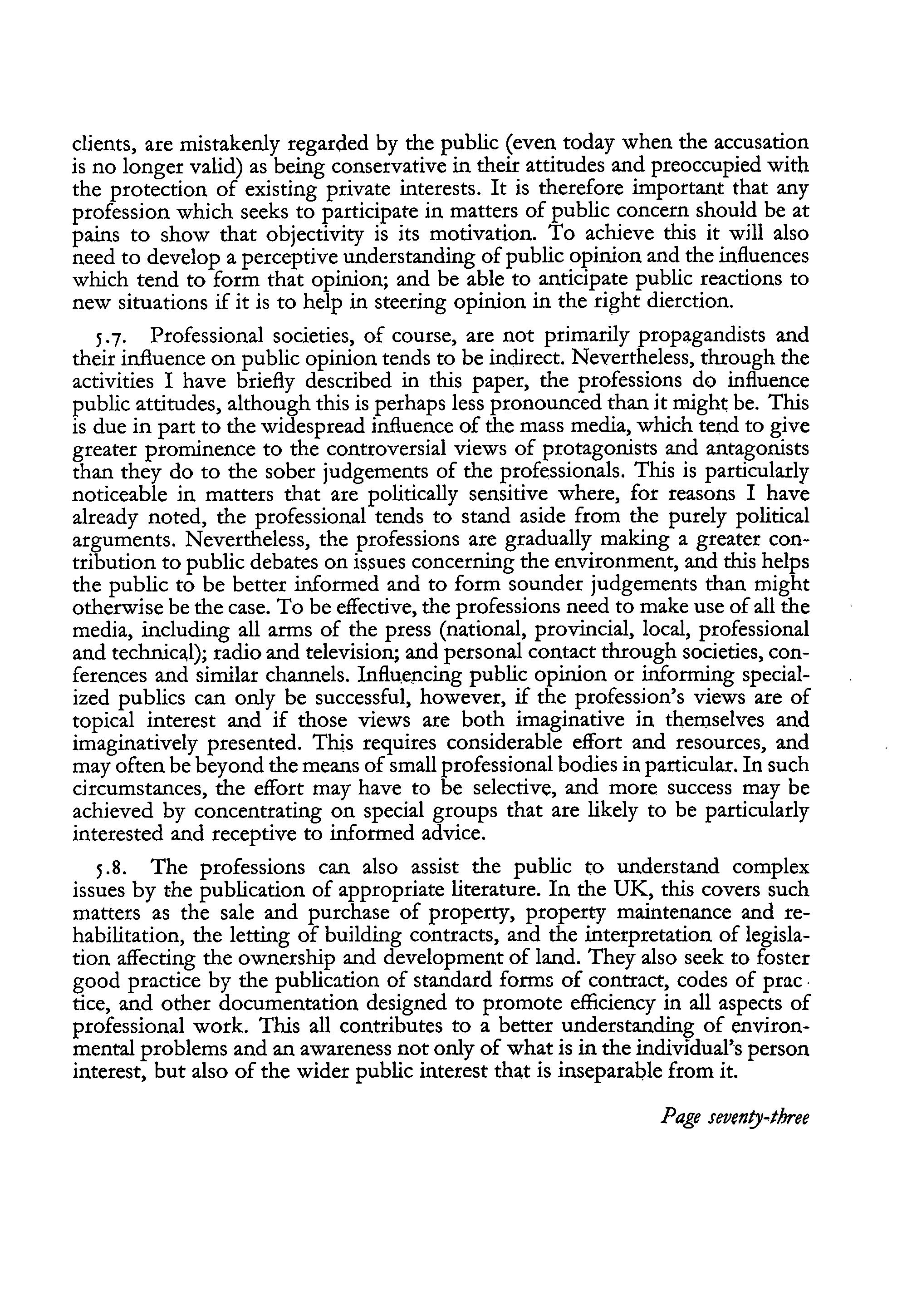
Page seveny-three
6. CONCLUSION 6.1. The report of the Seminar sponsored by the Commonwealth Foundation at the University of Sussex in 1973 suggested that the newer universities needed to move forward from their primary role of producing graduates into the role of problem-solving and become involved as agents in the development process in co-operation with the professions and with opinion formers and policy makers within the government machine. I venture to agree with that view. It was also suggested, however, that greater attention might be paid to professional advice emerging from the universities, rather than from the professions themselves because the outlook of the professions tended to make them resistant to reform and new ideas. I hope that what I have said in this paper justifies a different point of view. 6.2. University advice is not a substitute for the advice of professionals who actually practise their profession. There is a place for both, in dealing with tasks to which their respective skills and experience are best suited. Moreover, most developing countries are so short of indigenous skills that maximum use must be made of every potential contribution, whether it comes from the universities, the independent professions, or the government service itself.
ANNEX D
RELATIONSHIPS BETWEEN THE PROFESSIONS AND THE UNIVERSITIES By John B. Macdonald, Executive Director, Council of Ontario Universities, Canada
Professions and universities have much in common. Ambiguity about their nature is a case in point. Eliot Friedson observed that the word 'profession' is evaluative as well as descriptive. 'Virtually all self-conscious occupational groups apply it to themselves at one time or another, either to flatter themselves or to try to persuade others of their importance. Occupations to which the word has been applied are thus so varied as to leave nothing in common, save a hunger for prestige."
We began, perhaps, with medicine, law and the clergy. Now the professions are commonly thought to include librarians, social workers, psychologists, dental hygienists, experts in physical education, home economists, actors and football players. Exclusion from such a list may represent nothing more than a failure to organize. Indeed, the tendency is to identify certain occupations as
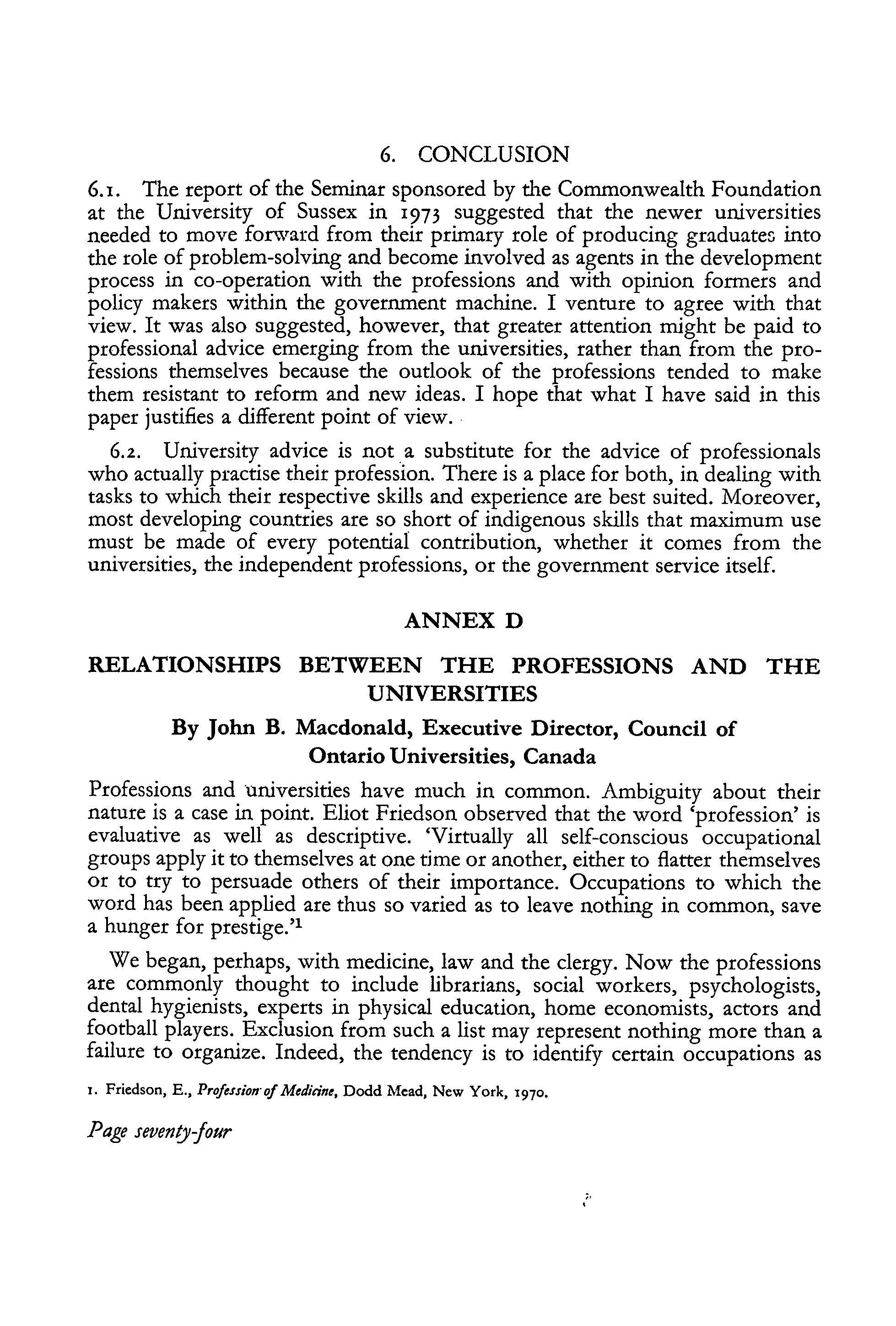
r. Friedson, E., ProfessionofMedii-ine, Dodd Mead, New York, 170.
Page seven1y-four
professions and then to seek for their common characteristics in order to define the meaning of the term. As a result; a Quebec Commission looking at the professions concluded in frustration that 'the notion of professions has slowly lost its meaning or, in any case, no longer evokes a certain number of precise and exhaustive criteria which would make it possible to distinguish it from other types of occupation of the alleged 'non-professionals." As a consequence, the word profession is ambiguous.
Ambiguity is no less characteristic of universities. Originally highly selective institutions for the training of an intellectual elite, they were dedicated simply to the preservation, transmission and enlargement of knowledge. Today they are instruments of public policy being used in many countries as a means of enlarging social justice. Following egalitarian principles, they have acquired massive new audiences. Open access has become a political objective. Students view admission to university not as a privilege but as a right. And having been admitted, why should they not receive their degree without examination on the grounds that marginal improvement in the level of education for large numbers is more important than substantive performance by the intellectually talented who will in any case be successful? Such policies and thinking are becoming commonplace in the mass higher education countries. Concurrently, many universities have expanded their programmes into a very wide spectrum of activities, many of which are of doubtful or negligible intellectual content. They have, in addition, become politicized, taken less and less responsibility for their students, have allowed the notion of a 'general education' to decay, and have neglected teaching in favour of other activities which for various reasons have seemed more attractive. What then is a university? Again, the answer is ambiguous.
Some resolution of these ambiguities seems necessary as a basis for discussing the relationship between professions and universities. Since common practice has applied the term profession so loosely as to be merely a synonym for a specialized occupation, and since that is not the intention of this Conference, a more limited working definition is necessary.
A. N. Whitehead defined a profession as 'an avocation whose activities are subject to theoretical analysis, and are modified by theoretical conclusions derived from that analysis'. He contrasted this definition with that of a craft which he described as 'an avocation based upon customary activities and modified by the trial and error of individual practice'.2 The distinction is useful but insufficient. It was broadened helpfully by the Committee on Legal Educa-
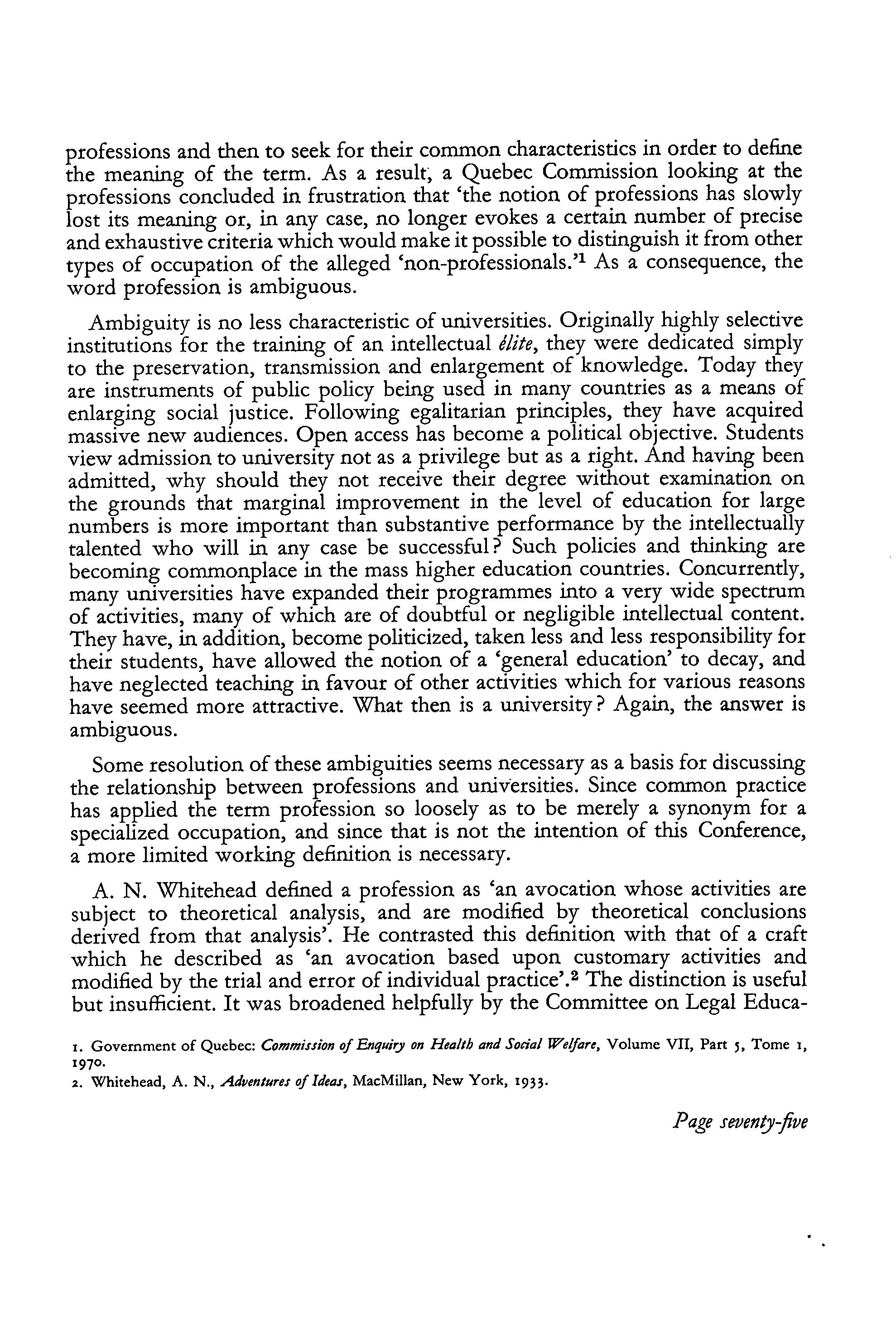
i. Government of Quebec: Commission of Enquirj on Health and Social Welfare, Volume VII, Part y, Tome i,
1970- 2. Whitehead, A. N., Adventures of Ideas, MacMillan, New York, z933.
Page seventy-five
tion of the Government of the United Kingdom which stated that all professions have the following characteristics. (i) a highly complex body of knowledge combined with the ability to use intellectual processes which are, at least to some extent, peculiar to the profession; (2) certain practical skills and professional techniques without which this knowledge cannot be applied in the practice of this profession; () the capacity to use such knowledge, from day to day, in the service of other people's interests and to solve, or help them to solve, practical problems arising within the sphere of the profession; () a particular kind of relationship with clients or patients, arising from the complexity of the subject-matter which deprives the client or patient of the ability to make informed judgements for himself and so renders him, to a large extent, dependent upon the professional man; and () a self-imposed code of professional ethics intended to correct the imbalance inherent in this relationship and to resolve inevitable conflicts between the interests of the client or patient and the interests of the professional man himself or of the community at large.'
Even these are not enough. Professions have emerged when the public consciousness has recognized the combination of a highly complex body of knowledge needed in the service of the public and the clients' dependence on the skilled persons providing the services and has therefore conferred autonomy or self-government on the occupation. It is at this point that professional status in its historical and traditional sense has been acquired.
Unfortunately the evolution of professions neither begins nor ends with this step. Autonomy brings derivative attributes. These include control of admission to the profession, control over the content and duration of the educational requirements for licensees, regulation of the conditions of practice, judgement of performance and application of sanctions and penalties against wayward members. Some would add that professional status confers a responsibility and a commitment to give first priority to serving the public interest. There seems to be little evidence to support the idea that such a service orientation is primary. Postulating such behaviour often seems to represent exhortation about how professions should behave rather than a conclusion based on empirical evidence. As we shall see, professions for reasons associated with their special status have frequently shown a disturbing blindness to the public interest.

i. Government of the United Kingdom, Committee on Legal Education, Report, Her Majesty's Stationery Office, London, 1971.
Page seventji-six
At the beginning of the evolutionary scale the appetite for professional status among groups that don't have it is strong. To quote the Castonguay Commission in Quebec: 'It cannot be denied that there is a race towards professional status in circles which do not have it. These circles begin by applying for incorporation in voluntary associations, then they seek compulsory membership with control over conditions of admission, and they conclude by seizing the regulation of practice conditions and the control of activity stemming from it. If these groups cannot be blamed for endeavouring to improve their status without preoccupying themselves with the social justification or the juridical, one is astonished, however, by the facility with which the legislator accepts such fragmentary argumentation and perspective and grants exorbitant common law systems, without undue concern for the social effects of "corporation" of professions and of the juridical disorder which this movement involves. In fact, applications for incorporation are inspired more by the desire to protect members of the profession than by preoccupation with the public interest."
One of the characteristics of professions which derives from their selfregulating status is that they establish powerful Associations. What I am about to say is critical of the operation and positions on policy frequently characteristic of these Associations. In expressing these criticisms I wish to make it clear that I am not criticizing the competence, integrity or dedication of individual professionals to their individual clients. My experience and impressions leads me to believe that at the level of the personal contract the individual professional person is more likely to be both able and honourable than in most other occupations.
The professional Association, however, frequently views its responsibilities from a position more sensitive to self-interest than to the public interest. Criticisms of a wide-ranging nature have been directed at the professional Associations by many powerful and prestigious governmental or quasigovernmental bodies, to say nothing of the voluminous self-criticism stemming from members of the professions themselves. In Canada, for example, the Economic Council of Canada, a governmental Task Force on Labour Relations, the Ontario Committee on the Healing Arts, the Royal Commission Inquiry into Civil Rights, and other similar bodies, have made bluntly critical observations. If the professions are to fulfill their proper responsibilities the criticisms cannot be ignored.
William Goode wrote that 'three professions - the clergy, the military and medicine - almost isolate their recruits from important lay contacts for several
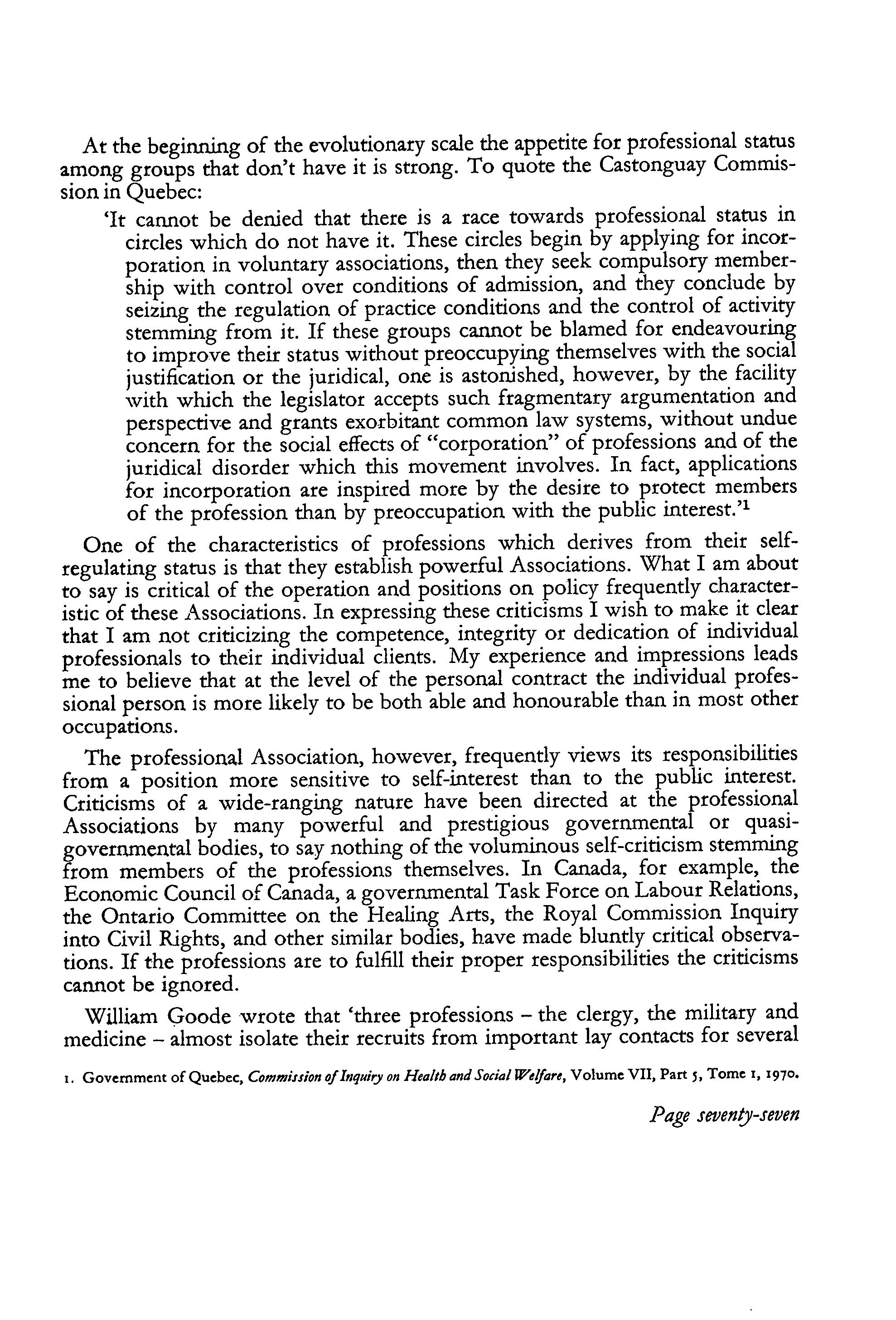
1. Government of Quebec, Commission of Inquiry on Health and Social Welfare, Volume VII, Part 5, Tome I, 1970.
Page seventy-seven
years, furnish new ego ideals and reference groups, impress upon the recruit his absolute social dependence upon the profession for his further advancement, and punish him for inappropriate attitudes or behaviour."
This phenomenon is not limited to the three professions named by Goode. It is characteristic of all self-governing professions. It creates closed communities whose members show a primary allegiance to the community. Accountability is internalized. Members are responsible to their colleagues and their Association which sets the rules governing behaviour. All this is in the name of service and members come to believe that their policies are the expression of their idealism and their commitment to the public interest. In fact the professions face a conflict of interest. Which shall be served, the public or the profession? Because professional societies tend to be closed, illusions come easily and members readily reinforce their convictions that what they are doing represents the best way to serve the public.
A few observations may illustrate how wrong those convictions can be if examined from the standpoint of public policy.
The American Medical Association, in the words of Michael Crichton., 'has worked to the detriment of the patient in nearly every way imaginable'.2 In 1930 it opposed voluntary health insurance such as Blue Cross. In 1932 it opposed prepaid group-practice clinics. In 1933 it began a campaign to block the construction of more medical schools and to limit enrolments in existing schools. More recently the AMA has fought bitterly against U.S. medicare proposals which were nevertheless implemented and brought health benefits to io per cent of the population. Similarly, the British Medical Association in the early 1950s opposed the introduction of the UK National Health Scheme. As recently as 1967 the President of AMA was publicly deploring the notion that medical care should be a right rather than a privilege. It is hard to separate these reactionary policies from the fact that although the U.S. spends relatively more on health care than any other country in the world, it is by no means the leader in terms of the health of its people. The U.S. ranks thirteenth behind several West European countries in infant mortality. The figure is similar for maternal mortality, deaths from heart disease, cirrhosis and a number of other indicators.
William Pincus, a lawyer, has written on 'The Lawyer's Professional Responsibility'.3 Among his telling criticisms he makes the following points about American law. The profession failed until recently to show any great concern
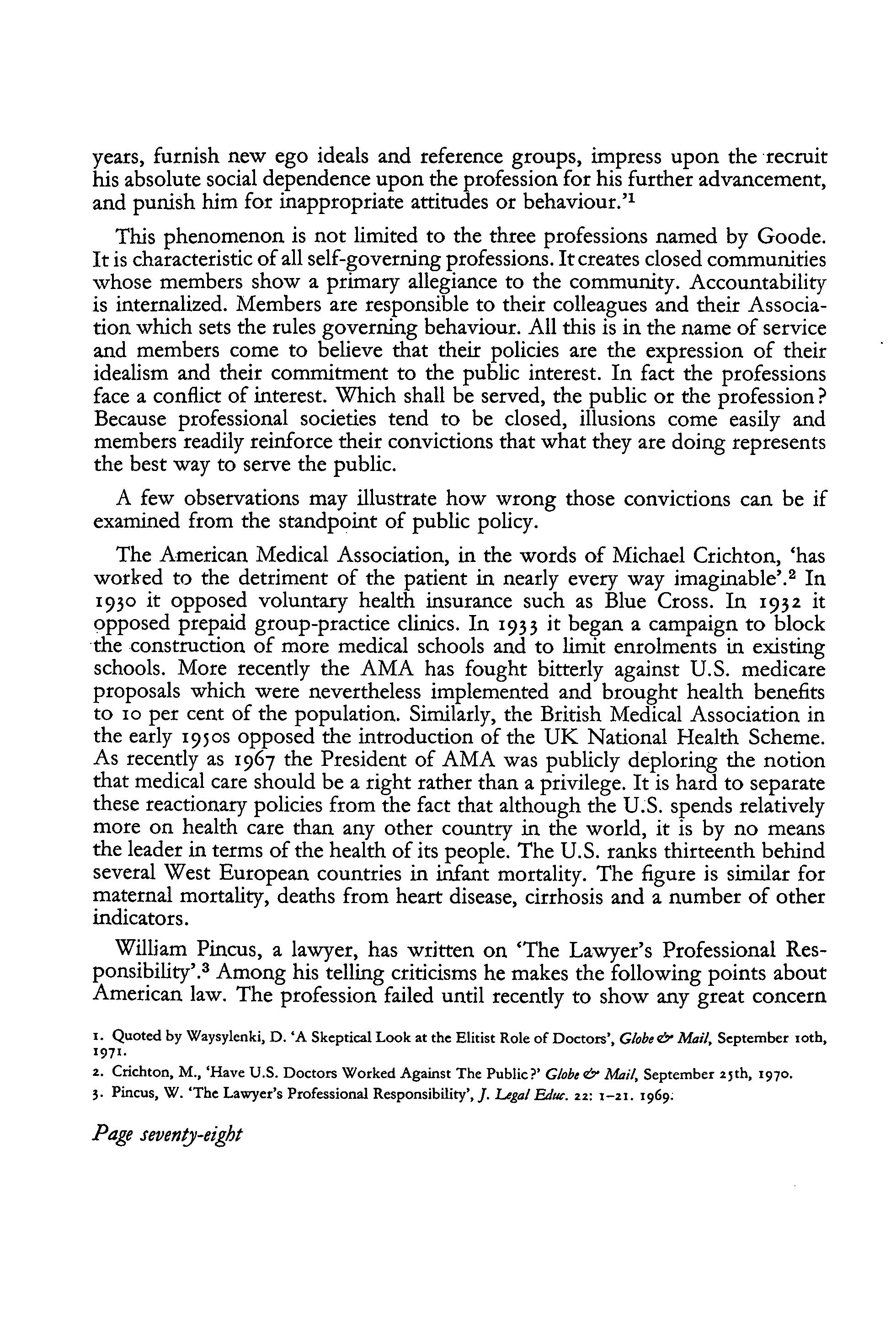
s. Quoted by Waysylenki, D. 'A Skeptical Look at the Elitist Role of Doctors', Globe ô Mail, September soth,
1971.
a. Crichton, M., 'Have U.S. Doctors Worked Against The Public?' Globe & Mail, September 25th, 1970. 3. Pincus, W. 'The Lawyer's Professional Responsibility', J. Legal Educ. 22: 1-21. 5969.
Page .ceventj'-eight
for the extension of legal aid to the poor. A few pressed the case and performed 'feeble but valiant deeds which kept the record of the legal profession from being altogether dismal'. The profession has neglected the introduction of cheap and efficient administrative procedures which could replace the need for expensive lawyers' services. The handling of litigation resulting from auto accidents remains a disgrace with most persons involved coming out of the process miserably. The profession has looked upon the handling of tax matters by accountants as a threat and has given little attention to the need to provide a variety of para-professionals who could offer services more economically than through the present arrangements.
The attitude of organized dentistry towards the use of ancillaries offers another notorious example of a profession deluding itself into believing that the public interest is being served when in fact the profession's policy represents a myopic approach to self-interest. Dental nurses in New Zealand have provided care for children for more than fifty years. The state of dental health of New Zealand children has been shown repeatedly to be much better than in countries which rely on the skills of the dentist which are generally expensive and in short supply. Yet the profession continues to resist the introduction of comparable schemes in other countries. In recent years dental organizations have been waging bitter wars against the right of technicians to deal directly with the patient in fitting false teeth. In spite of the dental lobbies, governments are gradually giving recognition to the claims of technicians. The resultant services have been generally satisfactory and cheaper.
These examples can be expanded by reference to certain common tendencies among professions which help to maintain the monopolies and add to professional prestige. Professions tend to require high standards for admission to educational programmes. Are they set where function demands, or are they artificially inflated to enhance prestige and to limit numbers? Curricula tend to be demanding and long. Is this because of the complexity of the subject or to prove the right to exalted status? Requirements for licensing are frequently based on considerations that extend beyond competence. Is this to protect the public interest or to guard against over-population of the profession or to maintain a unique professional image?
Turning to the universities, it can be said that their current ambiguities began with the enormous growth in enrolments which took place in the I95OS and i 960s. The result of growth is that higher education has been transformed from a small privileged elitist activity to a massive public enterprise. That fact has great significance because growth has brought with it and in its wake profound changes in the quality and character of universities. Before the growth period, universities were places for privileged minorities. They were perceived as a training ground for an intellectual elite. They saw their task as that of
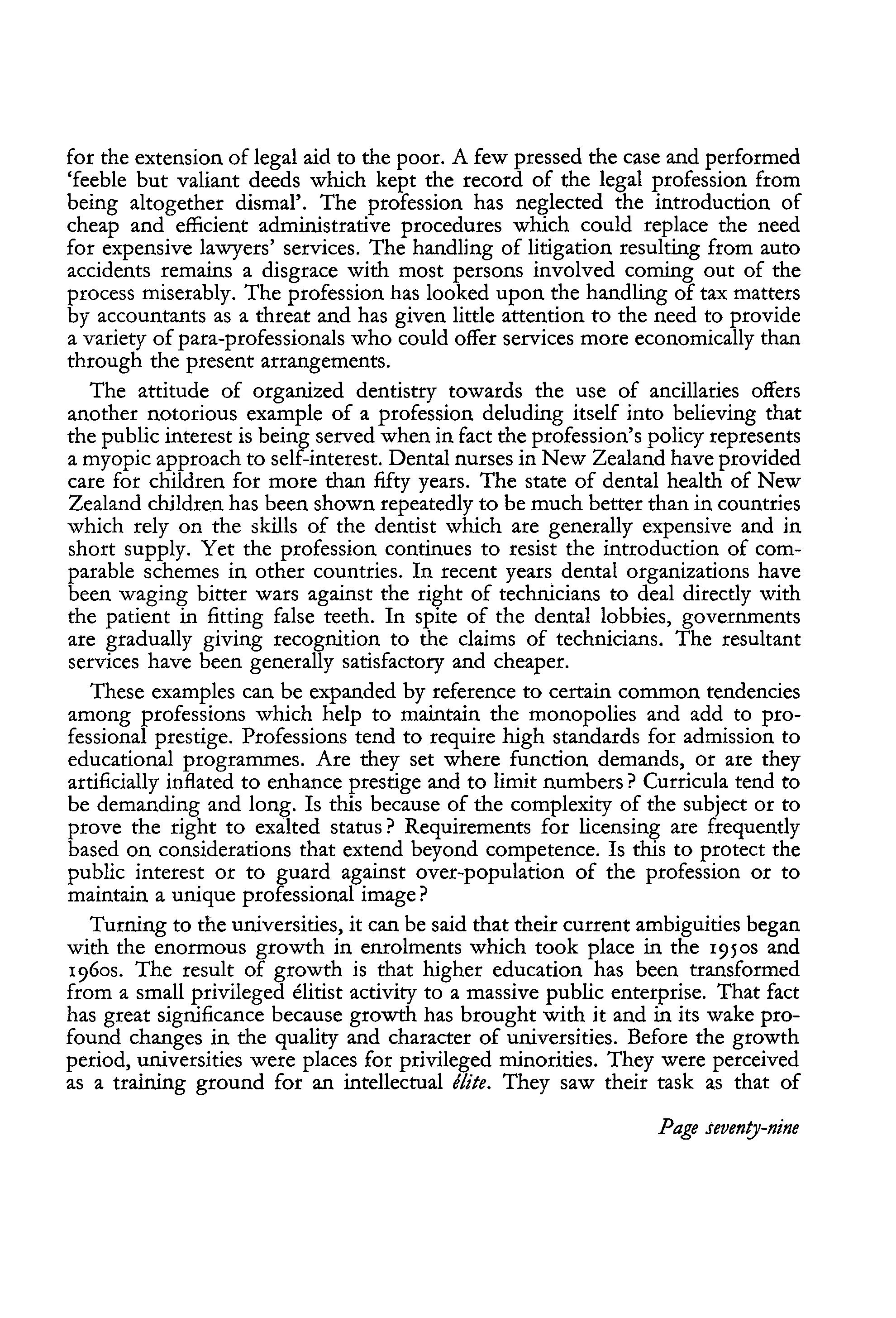
Page seventji-nine
identifying and cultivating intelligence. Little attention was given to the evidence that they were, in fact, serving a social and economic elite and that their student body was drawn disproportionately from the upper and middle classes. They simply sought from this aristocratic pool the meritorious, and cultivated them.
Growth has changed that situation. Entry is now looked upon in many countries as a right. The public is concerned about equality of opportunity and pressures have built to correct inequities. Student aid programmes have not been enough. Criteria for admission have been criticized on grounds of bias against the culturally and economically disadvantaged. Access on grounds other than academic performance have become commonplace, e.g., the use of quotas and affirmative action programmes to see that the composition of the student body reflects the composition of society in the distribution of minorities - economic, ethnic, racial and sexual. Compensatory programmes for the unqualified are introduced making the university curriculum acquire some of the attributes of secondary and even primary school. Ultimately, open access is tried so that there is a complete departure from any dependence on prior performance.
When students are admitted in this way, as they have been, for example, at Vincennes University in France and at the City University of New York, the next logical expectation is equality of results based on the democratic principle that all social strata should share in leadership. Exams begin to disappear as students and junior faculty in the enthusiasm of participatory democracy begin to set standards and curricula and define educational objectives.
As these movements progress, governments, which in the beginning encouraged and supported growth and which retain a commitment to accessibility, become alarmed at the costs and concerned over performance. They see themselves as defenders of the public interest and begin to believe that they may be better qualified to manage and direct the universities than are the institutions themselves.
What I have described may seem like a caricature and certainly all of us can point to universities where none of these sequelae to growth is evident. Nevertheless the evidence is overwhelming that in many countries of the world the evolution of universities is taking this general form. The pace varies and the steps (many of which are omitted here) are not everywhere the same.
What will be the end result? How can we conceptualize universities in less ambiguous terms? That question cannot be answered with any certainty but if the very idea of a university is to survive some old values must be retained and some new values added. The universities must be places for the preservation, transmission and enhancement of knowledge if they are to be universities. They Page e;gh1v
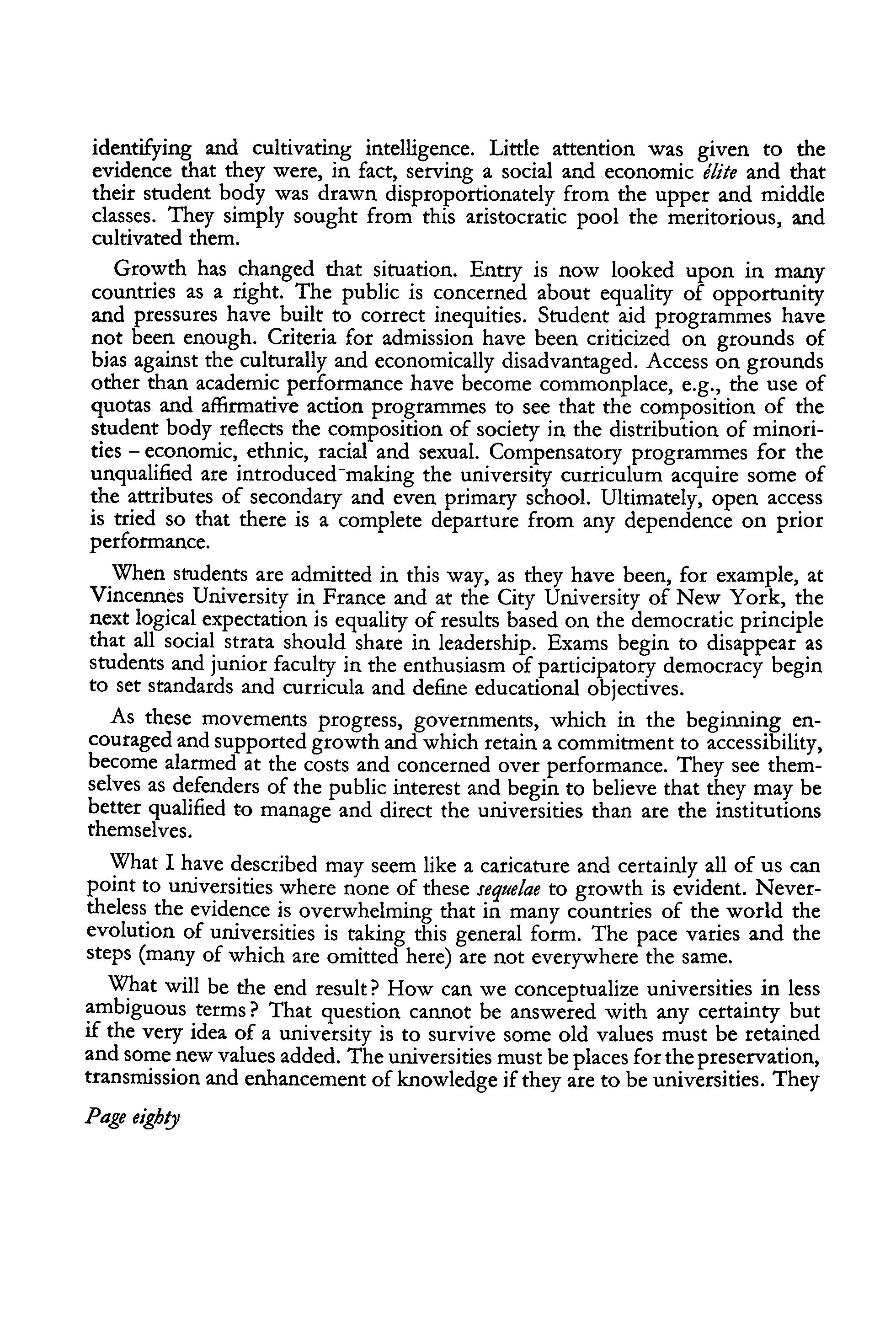
must therefore be places of scholarship. At the same time universities must, be places committed to social justice, to equality of opportunity. The cause of the universities' dilemma is the difficulty of reconciling both scholarship and opportunity. In the name of opportunity, universities must find ways to lower the drawbridge. They must involve themselves in imaginative financial aid, give more attention to early education, propose ways of combating cultural disadvantage, provide generous admission policies for the disadvantaged and devise effective compensatory programmes to help the academically handicapped. In the name of scholarship and their obligation to seek out and cultivate intellectual leadership, universities must reject the notion of equality of results. All men are not equal. Abilities, talents, motivation, courage, determination and interests are highly variable. Universities must recognize and reward performance. The contrasting goals of scholarship and opportunity are not mutually exclusive, but they are not easily achieved. The unambiguous university of the future will be the university firmly committed to both goals. Within the university the academic is a professional having virtually the same attributes as other professions. He deals with a highly complex body of knowledge; he exercises practical skills associated with this knowledge; he uses the knowledge in the service of others; he is a member of a largely autonomous group which is self-governing; he controls admission to the profession and determines the educational requirements for acceptance into the community of scholars. Like other professions, the academic has established powerful professional associations such as the Association of University Teachers in the UK, the Canadian Association of University' Teachers, the American Association of University Professors. It should and does follow that the academic community has been as guilty as other professions of promoting self-interest. The academic profession has pressed for earlier granting of tenure and has allowed it to be used for the protection of the incompetent. The practice of adding courses of interest to highly specialized faculty members without considering their relevance to educational goals for the student is well known. The insistence that high staff/student ratios be maintained and that teaching loads be kept small serve the faculty but do they really serve the students and the public as claimed? How much attention is paid to the quality of teaching in assessing eligibility for promotion? These and other problems prompted the participants in a seminar on Ontario universities to conclude that: 'The faculties of universities are, for the most part, composed of professional people concerned with high standards of professional conduct and service. In recent years, however, the academic profession like many others has appeared to be increasingly selfserving. The right of any professional group to complete autonomy and selfregulation is now under question and the academic profession can be no Page eigby-one
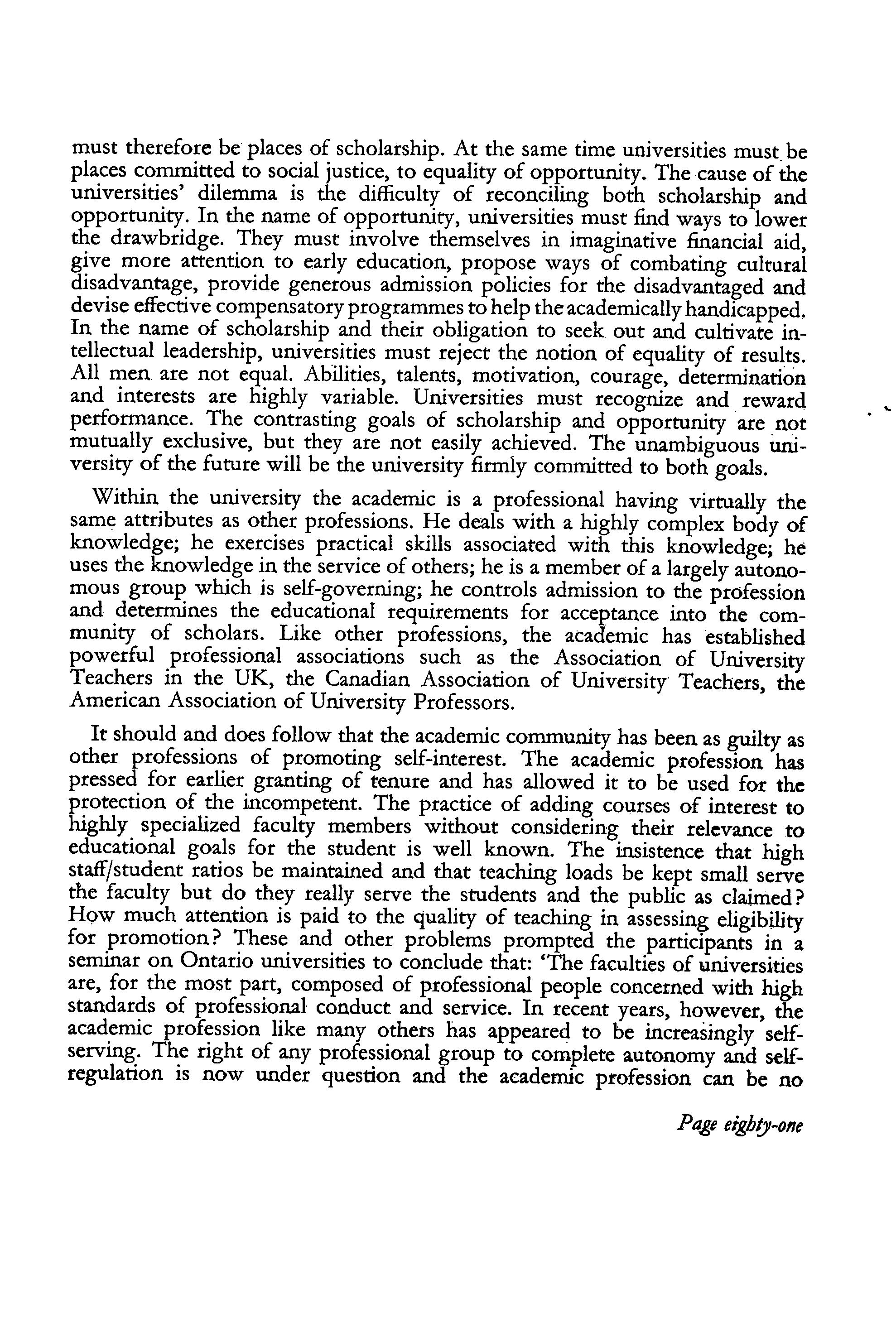
exception. The day when such complete autonomy and authority were possible has passed. The academic profession would do well to be conscious of and sensitive to public concerns about some of its practices and privileges."
That in fact is my conclusion. The practices and privileges of professions as conventionally organized do not serve the public interest as well as they could. Some change is called for. Milton Friedman has referred to the poverty of our imagination in not devising alternative approaches to the organization of professional services which would serve the public better.2 As an example, he proposes a model which rejects the idea of licensure in order to eliminate the monopoly position of professions. He claims that licensure has not ensured professional competence and that reliance on market forces would be more reliable. He notes that persons 'do not now choose physicians by picking names at random from a list of licensed physicians'. Further, 'a man's ability to pass an examination twenty or thirty years ago is hardly assurance of quality now'. Friedman's solutions are based on the operation of market principles and are not attractive. Among other difficulties, they ignore history. They were perhaps intended mainly to provoke consideration of the need for some modifications in the current approach.3 A more modest approach might be workable.
The key is to provide governance for the professions which is responsive to the public interest, and that means modifying the monopoly. The simplest way to do this would be to have the public generously represented on the governing bodies of the professions. Moves in this direction have been taking place in some countries but they generally have been token moves. In my view, the representation from the public should equal the representation from the profession. A balance of this kind would reflect fairly and properly both the wider interests of the public and the unique and important characteristics of specialized knowledge on which each profession is based. Professionalization involves a drive toward specialization with an increasing tendency to fragment knowledge. Good planning and policies require expertise but as Harold Laski observed, the expert should be on tap, not on top. The perspectives of the specialist must be reconciled with those of the generalist.
A partnership of public and profession will aid both. The profession will gain the advantage of a better perception of public concerns and priorities than is the case when the profession is making unilateral decisions. In the latter

i. Ontario and Its Universities, Higher Education Seminar, York/University of Toronto, 1973-74.
Friedman, M. Capitalism and Frcedom, University of Chicago Press, Chicago, 1963.
It is worth noting that not all occupational groups sharing the characteristic of applying sophisticated knowledge to the clients' problems are organized as self-governing professions. Commercial airline pilots offer a notable example. They hold responsibility for the lives of hundreds of persons each time they exercise their
specialized knowledge and skill. Yet they are controlled by the rules of the corporations employing them and
by governmental regulations. Without the characteristic of self-governance they perform at a very high level of competence.
Page e:ghy-two






